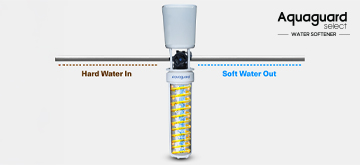
Is Softened Hard Water Safe to Drink? Myths vs. Facts
PUBLISHED ON: 30-Oct-2025
While water is fundamental to our well-being and everyday routines, its quality isn’t always uniform. Hard water, common in many regions across India, poses several practical challenges. Rich in minerals such as calcium and magnesium, it often leads to limescale buildup in pipes, reduced efficiency of water heaters, and everyday concerns like dry skin and dull hair.
To address these issues, many people consider installing a hard water softener. However, a common question arises: Is softened water safe for drinking?
In this article, you will get to know about the facts and myths surrounding softened water for home use.
Common Myths About Drinking Softened Water
Despite its benefits, several myths surround the consumption of softened water:
Myth 1: Softened Water Is Bad for Skin and Hair
Some believe that softened water can make skin feel slippery or leave hair limp.
Fact: Softened water is gentler on both skin and hair because it lacks the hardness-causing minerals that lead to dryness, soap scum, and dull hair. By reducing calcium and magnesium content, it allows soaps and shampoos to lather better, rinse more effectively, and leave skin and hair feeling softer and smoother. Softened water is especially beneficial for people with sensitive skin or those prone to dryness.
Myth 2: Softened Water Tastes Unpleasant
People worry that softened water tastes odd or artificial.
Fact: But in reality, when a water softener is properly installed and maintained, the water tastes clean and neutral. By reducing calcium and magnesium, softened water prevents the mineral aftertaste often associated with hard water, making it more enjoyable for drinking, cooking, and preparing beverages like tea and coffee.
Myth 3: Softened Water Removes Essential Minerals
Another misconception is that a water softener for the house removes all minerals, leaving the water nutritionally deficient.
Fact: Softened water can retain some of the trace minerals found in water and continues to provide essential hydration. The main difference lies in the removal of excess calcium and magnesium, which impacts household systems and appliances but has little to no effect on the water’s nutritional value.
Myth 4: Softened Water Cannot Be Used for Cooking
Many people assume that softened water will alter the taste, texture, or nutritional value of food.
Fact: Softened water can actually improve the taste of cooked food by preventing mineral buildup that alters the texture of rice, pulses, and drinks such as tea or coffee. It is completely safe for daily cooking and does not reduce the nutritional value of ingredients.
Myth 5: Water Softening Wastes Water
A common concern is that water softeners consume excessive water during regeneration.
Fact: Modern water softeners, such as the Aquaguard Select AWS series, are designed for efficient regeneration, using minimal water and salt while maintaining optimal performance. These systems monitor water usage and regenerate only when necessary, avoiding unnecessary wastage. With proper installation and maintenance, a hard water to soft water converter provides a sustainable hard water solution without significantly increasing water consumption.
Benefits of Drinking Softened Water
Softened water is not only safe for drinking but also offers multiple household advantages:
- Healthier Skin and Hair: Reduced mineral content prevents dryness, helping skin remain smooth and hair soft.
- Improved Appliance Longevity: Pipes, geysers, washing machines, and dishwashers last longer without limescale buildup.
- Better Cleaning Efficiency: Softened water allows soaps, shampoos, and detergents to lather and rinse more effectively because it’s free from hardness-causing minerals like calcium and magnesium.
- Cooking Advantages: When soft water is used in the kitchen, it helps prevent limescale and mineral deposits in kettles, cookware, and coffee machines.
Choosing the Right Water Softener
Selecting the right water softener is crucial for ensuring safe, softened water throughout your home while protecting your plumbing and appliances from hard water damage. Effective options include:
- Aquaguard Select AWS C-1200 Water Softener: Compact yet powerful, this system is ideal for small to medium households. It efficiently reduces water hardness, prevents limescale buildup in pipes and appliances, and ensures a consistent supply of soft water for drinking, cooking, and daily chores. Its easy-to-use interface and minimal maintenance requirements make it a practical choice for modern homes.
- Aquaguard AWS I-600 Water Softener: Specifically designed for bathroom use, this water softener delivers softened water directly to showers, taps, and other fixtures. Reducing mineral content prevents dry skin, brittle hair, and scaling on taps and showerheads. Its compact design and reliable performance make it perfect for homes looking to improve comfort in bathing and personal care.
Both systems leverage advanced ion-exchange technology to provide a consistent supply of soft water, with user-friendly features such as easy installation, minimal maintenance, and long-lasting performance.
Conclusion
Softened water is safe to drink and offers multiple benefits, from improving personal hygiene to protecting appliances from limescale. By choosing the right water softener and ensuring proper maintenance, people can enjoy a consistent supply of soft water for drinking, cooking, and bathing.
Investing in a reliable water softener ensures lasting comfort, convenience, and protection for your home. Designed with advanced regeneration technology and IntelliMix technology, these systems deliver consistently soft water while optimising salt and water usage.
Frequently Asked Questions
Is softened water safe for babies and children?
Yes. Softened water is generally safe for children. For infants, it’s best to use softened water with low sodium content or consult a paediatrician to determine the best option.
Can I use softened water for drinking and cooking every day?
Softened water is safe for everyday consumption and improves appliance longevity, cooking, and cleaning efficiency.
How do I know if my home needs a water softener?
Check for signs of hard water, such as limescale buildup, dry skin and hair, and soap scum. Homes experiencing these issues may benefit from installing a water softener.
